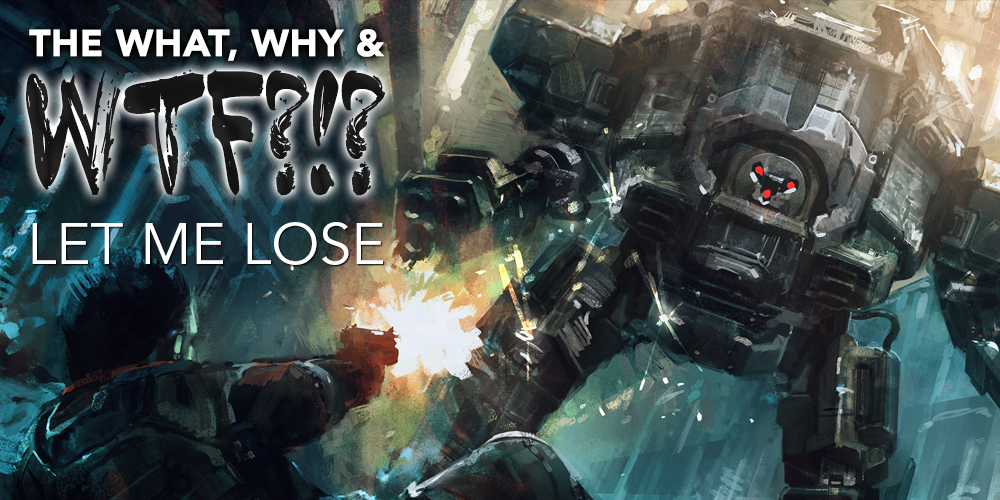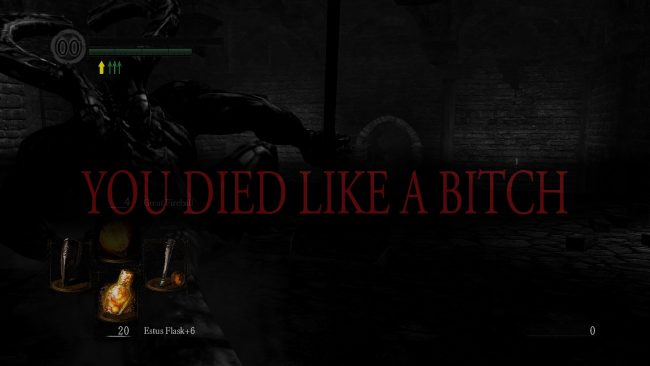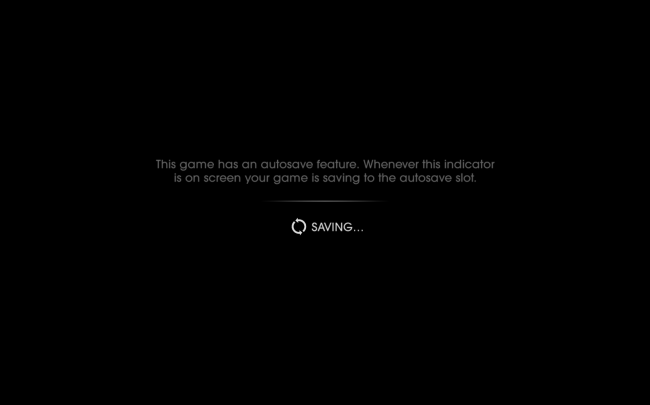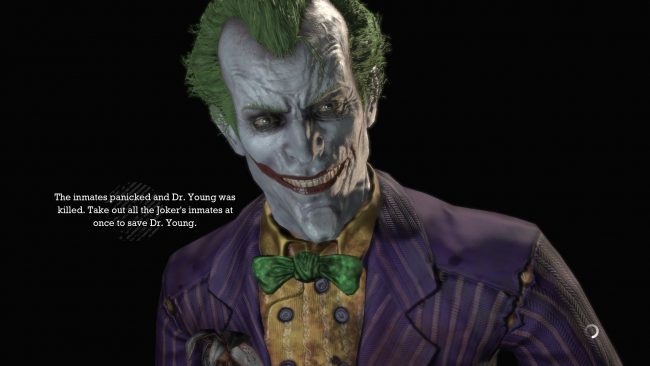
Winning is such a drag these days. You have to play the game and git gud, but there comes a point where winning just doesn’t hit the spot. On those off days where you forget to play Rocket League with a controller, losing is there to pat your back and take an angle grinder to your enthusiasm. There’s nothing quite like the sensation of pure disappointment, like the pang of guilt you feel when a small child trips you. You’ve been bested, there’s no escaping it, and now you must suffer the consequences. If this were a video game, though, you could just go back to the checkpoint and shoot the kid in the head.
Losing has become a dying art form in video games. Achieving victory has remained a classic end goal, but loss seems to have evaded the attention it deserves. When we lose, we restore back to a checkpoint nearby with almost zero repercussions for our failure, but there’s so much more that could be done. Older games saw losing as an opportunity, not an inconvenience, and with more meaning invested into our failures, our experiences of the game are more memorable. Of course, you’ve probably never lost a game in your life (such are the standards I assume of our readers), so let’s get you acquainted with what happens when you fall down the bottomless pit.

This is a real mod. You win a lot more when it’s active.
got rekt
Games are just systems of rules that define what you’re allowed to do, including how you win and how you lose. The lose condition (assuming there is one) can be defined a number of ways, like running out of health in an FPS or having a key part of your base destroyed in an RTS. If the other guy wipes you out in SC2 before you’ve even unlocked Stalkers, you are deemed to be the loser and the game ends. This makes a lot of sense for competitive games because they tend to be shorter and start both players in a balanced fashion. For longer-form games, though, losing doesn’t seem like something you’d want the player to endure unless the developer put in all that effort hoping no one would reach the final level.
Losing is still common in some of the biggest singleplayer games of 2016. Battlefield 1 was praised for its campaign, but how was losing treated? In the first mission, death meant you inhabited a new soldier, emphasising the scale and mindlessness of WW1. After that, though, losing is less of a symbolic mechanic and turns into a minor inconvenience. You die, the game rewinds back to a nearby checkpoint, and you’re on your merry way. That’s it. Same deal in Infinite Warfare’s campaign, just a little wait and you’re back in the fight. If death means nothing more than having to wait a few seconds before you can shoot someone again, that doesn’t make losing much of a problem, which is, ironically, a problem.

This screen has defined a generation of casuals.
When you lose in a game, it shouldn’t just be a slap on the wrist, there needs to be something bigger at stake. EVE Online is a perfect example of where losing a battle can have dire after-effects, and Resident Evil 4 placed save points just far away enough from each other to make losing a hassle. Losing needs to cultivate loss, and games like Titanfall, No Man’s Sky and Dishonoured aren’t doing much in that department. When you think about the plethora of games out there, some that deal with losing as a rebirth more so than a conclusion, you can’t help but wonder why losing isn’t explored more as a mechanic than it currently is. Without consequence, losing isn’t losing, but why should you care when you could just get back into the game?
You Suck… For Now
Losing in a game isn’t just a matter of the game ending, it’s an incentive to get better. Behind your eyes is a gelatinous bulb that has the capacity to learn from mistakes, but you won’t just learn from minor setbacks. If the consequences of failure are so trivial that you could ignore them, you’ll be learning that it’s okay to lose. Obviously, this is casual talk. The desired outcome is winning, so losing shouldn’t be a slight disturbance to the overall flow of the game, it should be a significant disruption. Losing means loss, whether that’s in terms of progress or something else in the game, lest you grow tired of it.

You can’t be as much of a hero as this guy if you think losing is okay
Loss is critical in keeping failure interesting. Indifference to losing is just as bad as being indifferent to winning; the only differentiator between the two is how frequently they happen. It’s easy to fall into a state of ‘loss apathy’ (or as I call it, ‘being a filthy casual’) because losing is so uninteresting or trivial. Lose enough times and you’ll grow tired of it, no matter how close together those checkpoints are. If losing serves some other purpose, whether it be to restart with new equipment or show off replays, each loss has its own part to play in the game as a whole. Even something as simple as being forced to start from the beginning can be used to great effect, just look at X-Com’s hardcore mode. Of course, this is all for nought if losing is just downright off-putting.
Putting thought into how you lose is just as important as what happens when you lose. If losing is unsatisfying or disappointing, why would the player keep playing the game? This is the final chance for the game to convince the player to keep at it, so it better motivate the hell out of the player. Metal Gear Solid has the iconic dramatic scream as the protagonist dies, and the Arkham series had villains mock you when you fail. Both of these serve to motivate the player to press on, try again, prove the adversaries wrong and spit in their faces. These are so much better than a little consolation screen and a retry button, but there are even sneakier ways to handle losing in games…

Believe it or not, this is not subtle
Loss, The Cons Quencher
Chances are that devs would like you to make it through their game but still want you to be challenged in the process. The problem is when the challenge becomes too great, players just won’t be able to get past a certain area. Enter adaptive difficulty, where losing means the game will ease off on the insanity so that you can get through Struggle Town on your way to Victory Park. If you start to see yourself improving because the difficulty is lowering, you’ll be motivated to keep pushing. You might not even know it’s happening, you’ll just see that you’re getting better at the game, which is almost as brilliantly sneaky as a stray piece of Lego. Changing the difficulty on the fly doesn’t tend to go down well with people who want a consistent challenge, though, because they know they’ve got skills.
Perhaps your gaming abilities are somewhere between godlike and legendary, but losing is unavoidable because of luck or some other chaotic force. How dare the game cheat you like an imbecile with a credit card, you’re the very best around! If only there were some second chance system that used the game mechanics to let you skilfully resurrect yourself, like killing someone to come back to life in Borderlands. In a sense, this makes being good at the game even more important, since losing can be combated the same way you would win the game. Yes, this would be the best method to show your mettle at the LAN party, since you would be nigh invincible with the magic fingers you’ve trained over the years. Mind you, dying can have its own visceral joys.

Even if you lose, it’ll feel like a win
Isn’t it great when games put effort into death animations? Watching Lara Croft’s head get caught on a jagged log in some rapids, all those times you jumped into a sawblade in Super Meat Boy, Isaac from Dead Space’s day getting constantly worse… It’s wonderful. Unique deaths carry that, “I wonder how else I could die…?” quality that serves to reward players, even in death, because they’re entering new territory. Novelty’s a simple thing, but it works, and it pays in dividends to get better at the game to see what other marvellous ways you can destroy yourself. Why should losing mean you end up dead, though?
Losing need not lead to one state. Bloodborne had multiple conditions where you could die, but this could also lead to several scenarios. You could be taken back to a lamp, taken to the snatcher’s lair because you got caught, or even bypass a small section by getting killed. Battlefleet Gothic: Armada would punish you after losing based on how your ships fared, which was both interesting and infuriating. Losing as a mechanic rather than as a condition leads to some very interesting corollaries, and can help keep things weird in a land of stale. Too many games are content with loss leading to one state, but there’s so much more that could be done, and I want to see more from future games.

Losing should help the player get to here, not reinforce their loser habits
Final Thoughts
Losing presents an opportunity for game developers to experiment, but most games just aren’t messing around with loss. There need to be consequences to losing, whether it be punishment or some other disruptive mechanic. There is room to motivate the player through all sorts of cool little tricks, and as games keep getting more sophisticated, I’m sure we’ll see more of them being utilised. For now, winning is your best course of action, as it always has been and always will be. Now go spread death and famine to the casual slime, you magnificent winner, you.











